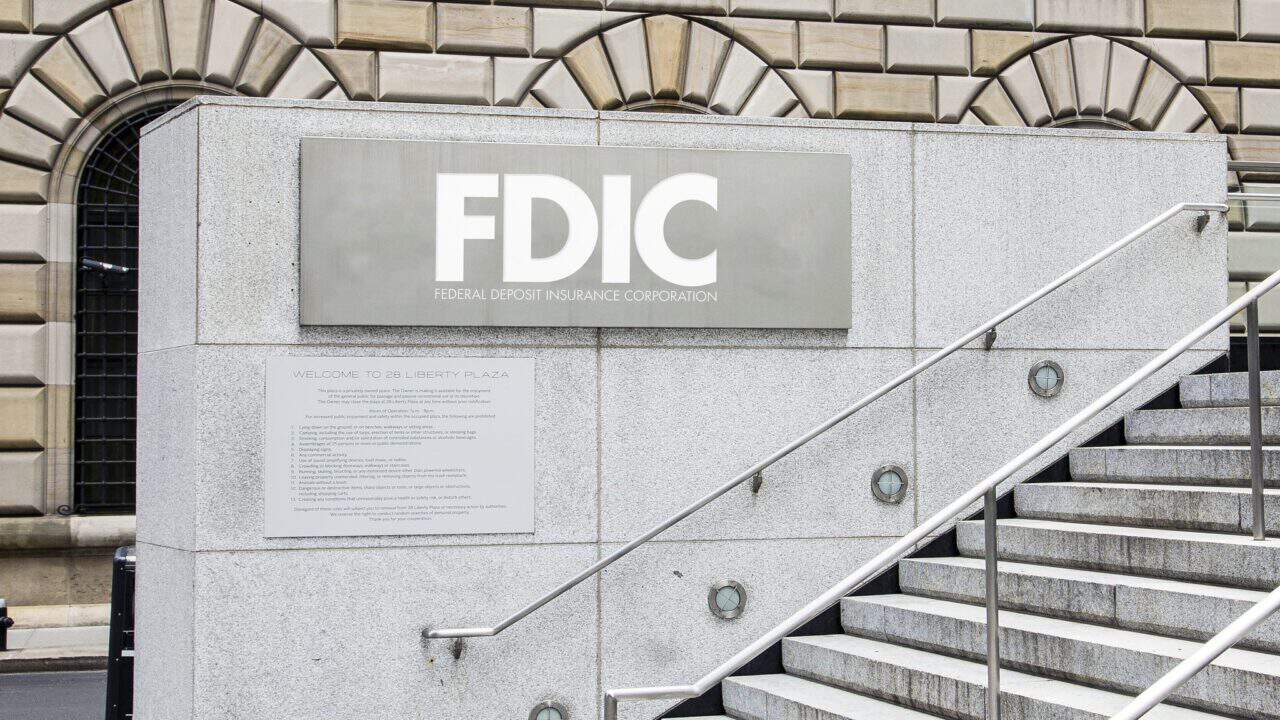 "FDIC" by Alpha Photo is licensed under CC BY-NC 2.0, https://www.flickr.com/photos/196993421@N03/52742848723/in/photolist-2omGToK-4yq1Cs-Tnncud-9CtC-2UBgg-6iN63F-bPWMXV-7aXCBZ-7aXCAV-5sDM9g-5sJbqE-2gJupd3-67suBY-7b2rEA-6URa3V-7b2rAo-7aXCyF-7aXCCP-5bFTZC-bB7VXE-bB7VXQ-2ogeByY-bB7VXq-bB7VY1-6iQF7T-6iQEMp-6iQERa-6iUQMQ-6iUQWd-6iUR63-6iUQR5-6iQEGr-6iUQHC-6iUQTE-21A6csy-bixgvn-GGiYyr-6z3ESZ-6iUQGb-6iUR1u-6iQF2g-7AEe3Q-7YqRmV-7Yu5LE-ZxGMDC-GGiYJX-7YqQHc-7Yu64Y-GGiZ9p-ZxGMNq
"FDIC" by Alpha Photo is licensed under CC BY-NC 2.0, https://www.flickr.com/photos/196993421@N03/52742848723/in/photolist-2omGToK-4yq1Cs-Tnncud-9CtC-2UBgg-6iN63F-bPWMXV-7aXCBZ-7aXCAV-5sDM9g-5sJbqE-2gJupd3-67suBY-7b2rEA-6URa3V-7b2rAo-7aXCyF-7aXCCP-5bFTZC-bB7VXE-bB7VXQ-2ogeByY-bB7VXq-bB7VY1-6iQF7T-6iQEMp-6iQERa-6iUQMQ-6iUQWd-6iUR63-6iUQR5-6iQEGr-6iUQHC-6iUQTE-21A6csy-bixgvn-GGiYyr-6z3ESZ-6iUQGb-6iUR1u-6iQF2g-7AEe3Q-7YqRmV-7Yu5LE-ZxGMDC-GGiYJX-7YqQHc-7Yu64Y-GGiZ9p-ZxGMNq
Americans for Tax Reform strongly opposes any legislative or regulatory attempt to increase or expand the current $250,000 cap on deposit insurance, including a temporary authorization. The moral hazard created by deposit insurance has resulted in an American banking system that has become subject to the will of the administrative state.
Taxpayers are on the hook for insuring deposits. Insured depository institutions, such as banks, will have to pay more fees to shore up the Federal Deposit Insurance Corporation’s (FDIC) Deposit Insurance Fund (DIF). The cost of these fees will be passed down to American consumers in the form of more expensive banking services, such as higher costs to receive a revolving line of credit through a credit card, which 83 percent of Americans use every day.
Expanding deposit insurance will make the banking sector more reliant on the federal government. If deposits are fully guaranteed banks could function more like government-sponsored enterprises, such as Fannie Mae and Freddie Mac. This will allow banks to take on excessive risk by investing in longer term securities that could be vulnerable to interest rate risk and induce a cycle of runs whenever the Federal Reserve decides to pivot its monetary policy. Fully guaranteed deposits will also give the government leverage to both determine which industries banks should favor and manipulate rates on loans. This is an egregious expansion of government power.
Americans have a median savings account balance of about $5,300 while Black and Hispanic Americans have median bank account balances of approximately $1,500 and $1,900, respectively. The result of the Silicon Valley Bank collapse is that these depositors will have to pay higher banking service costs to bail out Silicon Valley millionaires and billionaires. An expansion of deposit insurance will force lower income depositors to continue to pay higher costs to cover future bailouts for wealthy depositors.
By issuing the “systemic risk” exception as authorized in the Federal Deposit Insurance Corporation Improvement Act of 1991, the Biden administration has waived the requirements to determine the “least-cost” methodology for insuring bank deposits. The federal government has done this in the past. In 2008, the government established the Transaction Account Guarantee Program (TAGP) under the systemic risk exception. Now, in 2023, there are calls to establish another “temporary” program. Lawmakers are also discussing an increase to the deposit insurance cap altogether.
We know the temporary program will increase fees on banks because under the TAGP, if “fees were unable to cover bank defaults, the FDIC planned to levy a special assessment fee on the banking industry to cover the difference.” A de facto tax was imposed on banks, and it is being proposed once again.
The Government Accountability Office (GAO) and the International Association of Deposit Insurers (IADI) found the TAGP exacerbated moral hazard and “greater risk-taking.” Others claimed it threatened “long-term financial stability” and “increased the likelihood of future banking crises.”
There is no free lunch. These ideas will only worsen moral hazard and assuredly dismantle capitalism in the name of a socialist American banking sector.
Fortunately, at least one group of lawmakers has rightly drawn a line in the sand and made clear they diametrically oppose any universal deposit guarantee.
Members of Congress and the Biden administration should oppose any legislative or regulatory actions that would temporarily or permanently increase or expand the limit on deposit insurance. To do otherwise would place the U.S. banking sector in a positive feedback loop that encourages risky behavior, more bank fees, more bank runs, more government control, and more expensive banking services for consumers.
There is no need to cross the Rubicon.
Lawmakers can and should scrutinize: the “systemic risk” exception, the method for accounting mark-to-market losses on held-to-maturity debt securities, the composition of depositor homogeneity, and regulators’ supervisory duties.

